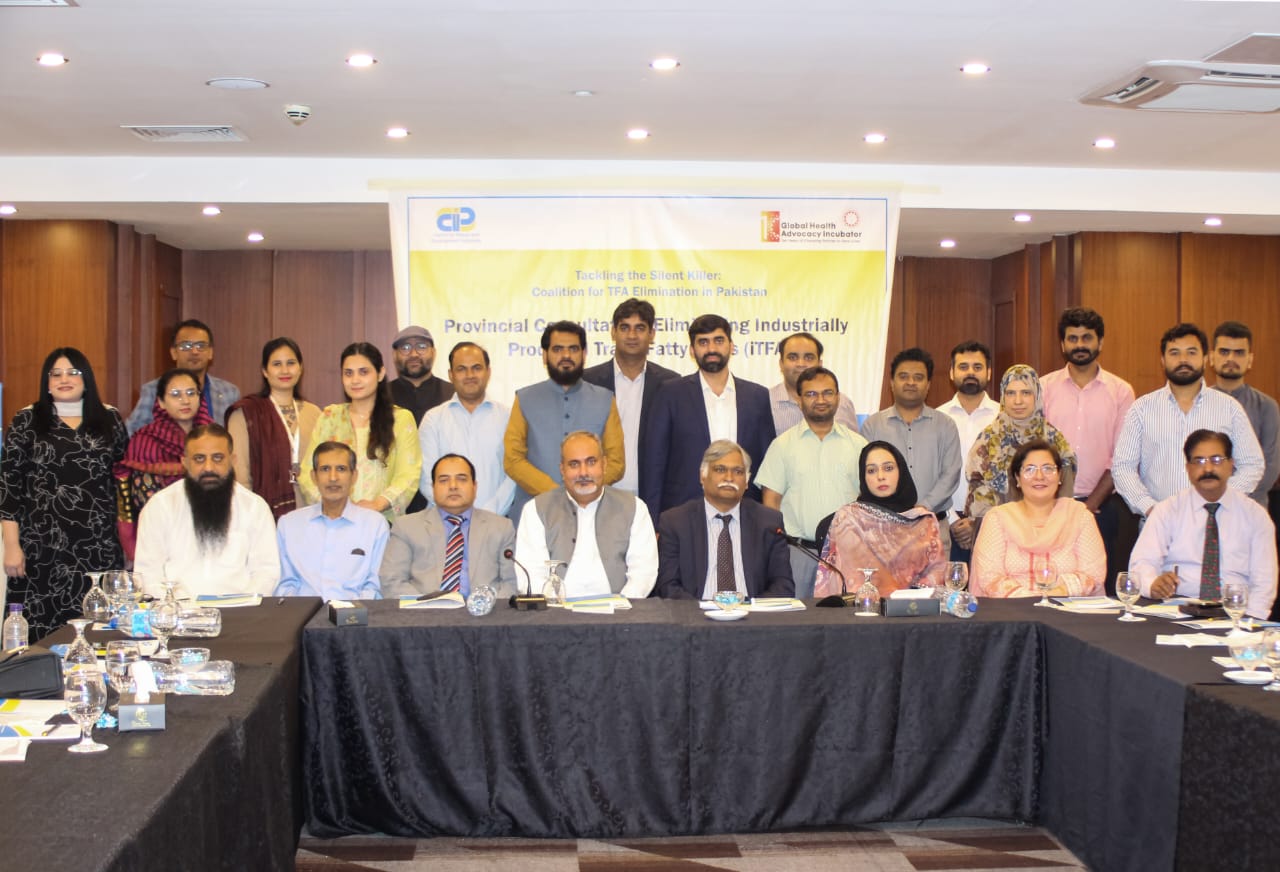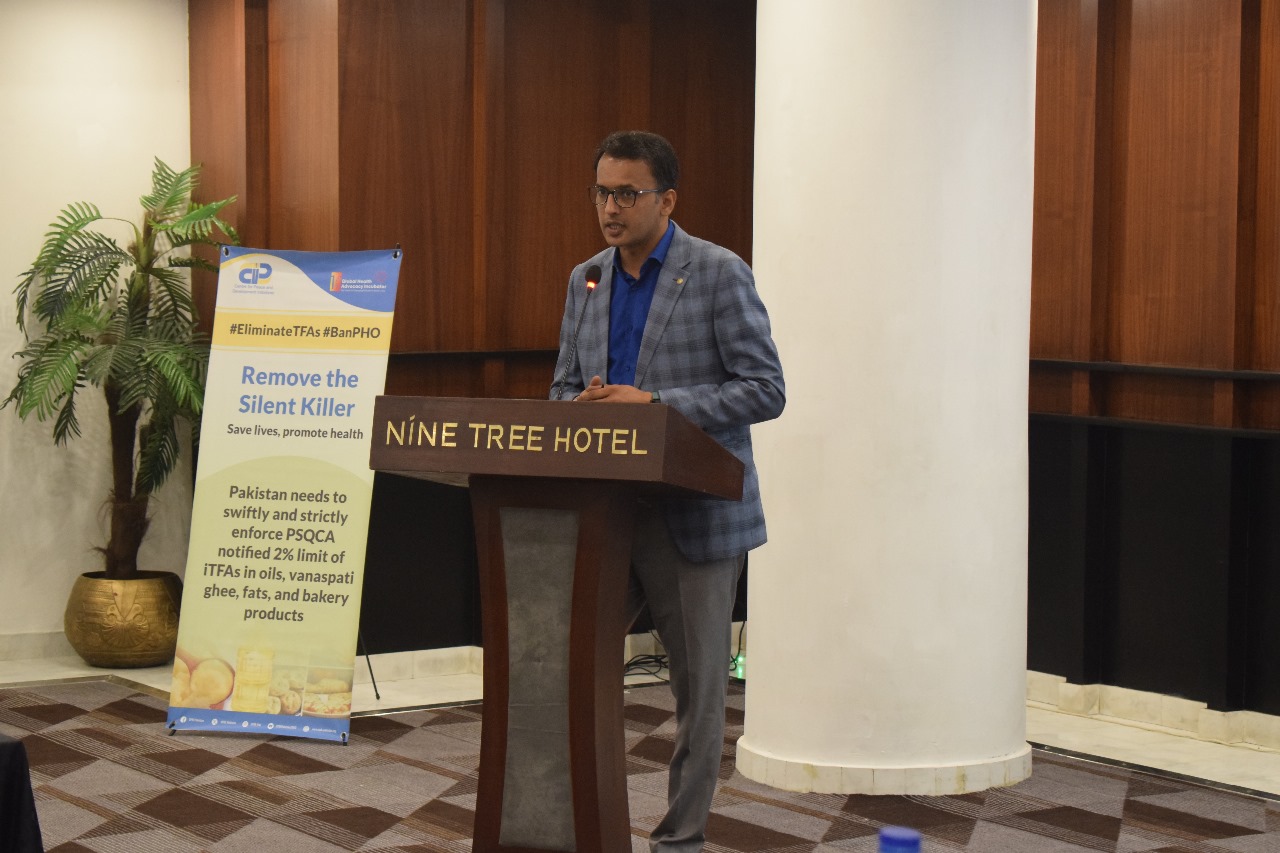CPDI calls for limiting trans fats in all foods immediately


Lahore — May 09, 2024
The Centre for Peace and Development Initiatives (CPDI) with the support of partners organized a provincial consultation aimed at tackling the health risks linked to the consumption of industrially produced trans fatty acids (iTFAs) in Pakistan. This gathering highlighted the urgent need for mandatory regulation to safeguard public health and mitigate the detrimental effects of excessive iTFAs consumption through diet.


Dr. Anjum Jalal, Executive Director of the Punjab Institute of Cardiology, said that with every passing day, people are dying with cardiovascular diseases due to high consumption of iTFAs in the diet. He stressed the urgency for Pakistan to adopt mandatory policies aimed at limiting trans fats to less than 2% in all foods.
Mr. Munawar Hussain, Consultant at Global Health Advocacy Incubator, highlighted that evidence from several countries who passed the mandatory iTFA limits reflects significant reduction in the diseases burden. He emphasized that limiting iTFAs in all foods will ultimately save precious lives from diseases, disabilities, and deaths. The policy will bring economic gains for Pakistan as well, in term of reduction in the hospital expenditures and more productive human resources.
Dr. Saba Amjad, CEO of Heartfile, shared iTFA consumption trends in Pakistan and said that though there is some progress made in Pakistan, but research shows that iTFAs is widely found in various food items. This underscores the need for adopting best practice policy to set no more than 2 percent limits of iTFAs of total fats in all foods without any exception.
While moderating the session, Syed Raza Ali, Project Manager, CPDI explained that Pakistan ranked 2nd highest in the WHO-EMRO region in iTFA consumption followed by Egypt. This alarming statistic correlates with a surge in multiple Non-Communicable Diseases (NCDs) and cardiovascular diseases (CVDs), imposing significant economic burdens on both individuals and the nation as a whole. Despite some measures taken last year, Pakistan still falls in the less restrictive category on the WHO TFA country score card.
Prof. Imran Pasha, Director General National Institute of Food Sciences and Technology and Ms. Farah Athar from Punjab Food Authority also highlighted the need for adopting best practice policy as per WHO recommendations by setting national iTFA limits of no more than 2 percent in all foods without any further delay.
While concluding the session, Dr. Anjum Jalal said Pakistan needs to immediately adopt mandatory limits of industrial trans fatty acids of no more than 2%, covering all foods, without further delay.
All key stakeholders, including Punjab Food Authority, PCSIR, PSQCA, academia, PANAH, and civil society, have come together to support and call for urgent limits on industrial trans fatty acids (iTFAs), to save lives and make healthier Pakistan.
For media inquiries or interview requests, please contact:
Syed Raza Ali
Project Manager
Cell: 0333-8827341
Email: raza@cpdi-pakistan.org
Recent Posts
- World
Sir Elton John prepares for the future amid health concerns
Sir Elton John has reportedly made plans for the future, purchasing a property near his…
- World
Iran warns US of strong response to threats of bombing
Iran’s Supreme Leader, Ayatollah Ali Khamenei, warned on Monday that the US would face a…
- World
Microsoft turns 50: leading the charge in AI and cloud computing
Microsoft marks its 50th anniversary this year, celebrating a legacy of innovation in the tech…
- World
Trump confident of tiktok deal before deadline
President Donald Trump expressed confidence in reaching a deal on TikTok before the April 5…
- Pakistan
Sugar import approval delayed as prices stay above government cap
The Pakistani government has yet to approve the import of raw sugar for re-export, amid…
- Lifestyle
Macaulay Culkin opens up about estrangement from his father and its impact
Macaulay Culkin has revealed the painful reason behind his decades-long estrangement from his father, Christopher…
Leave a Comment